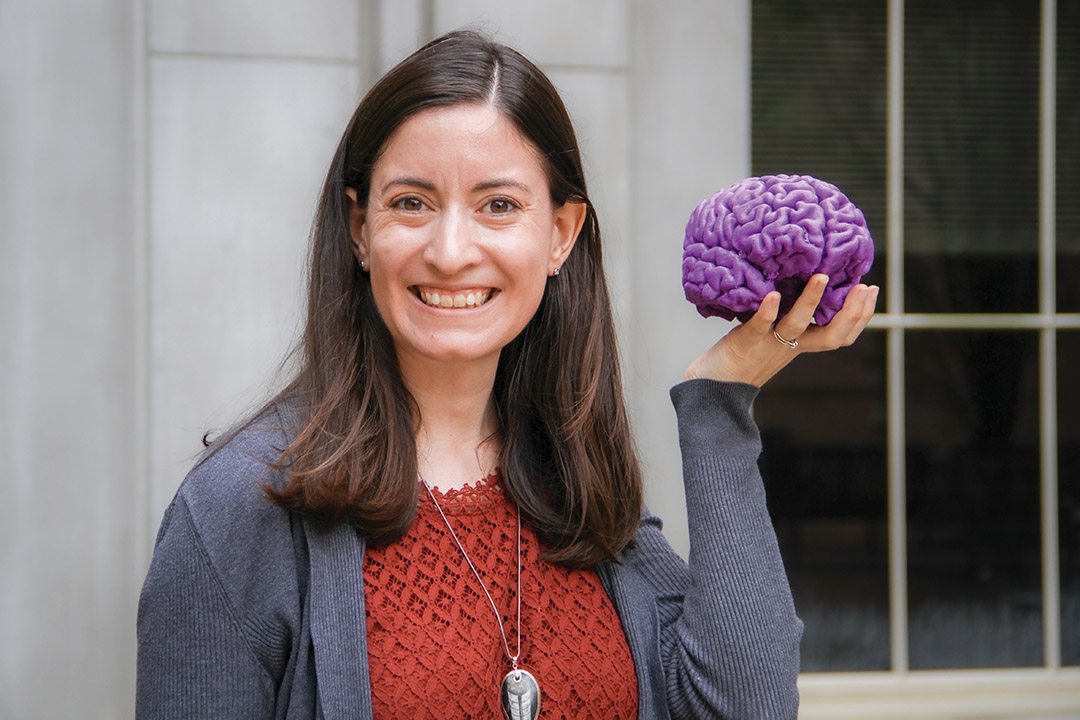Precision Cognition
Neuroscientist Caterina Gratton brings a lifelong passion to the fight against Parkinson’s disease

For her seventh birthday, Caterina Gratton’s parents pulled out all the stops: big colorful balloons, a delicious cake, and backyard activities galore. Gratton, now an associate professor of psychology and a member of FSU’s Program in Neuroscience, especially loved the brain game involving placards with color names written in non-corresponding color ink. All the kids raced to be first to identify the color name written on the card regardless of the physical ink color.
It wasn’t until years later that Gratton realized this game was a famous cognitive psychology exercise, the Stroop task, which showcases the difficulty of naming a physical color when it’s used to display the name of a different color — like blue ink used to write the word “red” — because of how the brain processes conflicting information.
But neurological tasks at birthdays and, later, theoretical arguments at the dinner table were a way of life for Gratton.
“Both of my parents, Italian immigrants who grew up outside of Rome, are cognitive neuroscientists. They came to the U.S. to pursue doctoral degrees; I was born when they were in graduate school,” Gratton said. “For a long time, I refused to accept that I enjoyed psychology because I couldn’t possibly be just like them!”
While her parents’ enthusiasm made a science career a no-brainer, Gratton tested other disciplines before ultimately returning to neuroscience. She earned a doctorate from the University of California — Berkeley and completed a postdoctoral fellowship at Washington University in St. Louis, Missouri, before coming to FSU in 2022.
“Many experiences growing up taught me that science is this amazing creative enterprise where every day is different, and there are always new problems that arise. This can seem overwhelming, but it’s satisfying to have new challenges and new puzzles to solve,” Gratton said.
Currently, Gratton is part of a multi-institution team funded by a five-year, $3 million National Institutes of Health Research Project Grant from the National Institute of Neurological Disorders producing reliable and detailed measures of an individual’s brain networks — representations of how brain regions communicate together. The goal is to identify how specific differences in brain networks affect symptoms and progression of Parkinson’s, a disease that affects nearly one million people in the U.S. and more than 10 million worldwide.
“Caterina brings an amazing set of skills and expertise in brain networks that complement our growing neuroscience group, and she’s helping make FSU a nationally recognized center of excellence in fMRI and human neuroscience... she’s a star on the rise in the field.”
— Brad Schmidt, Department of Psychology Chair
Among the key tools in Gratton’s work is a functional MRI, which measures small changes in blood flow that occur with brain activity and can be used to assess areas of the brain handling critical functions, as well as to evaluate effects of disease. However, fMRI signals produce data on individual brain networks that is inherently noisy, or unclear, so researchers have overcome this issue by averaging data across large groups of people. Averaging data makes it difficult to determine how differences in individuals affect the trajectory of disorders like Parkinson’s.
Gratton’s team has developed major innovations to address erasure of discrete details and precisely define brain networks by collecting extended amounts of data and combining individuals’ data with advanced denoising methods.
“We hope this information eventually points us toward markers to track to better understand prognosis of Parkinson’s as well as potential treatment targets,” Gratton said. “It means the world to do work that can improve the lives of so many.”
Gratton’s research has also been supported by the National Institute of Mental Health, the National Institute on Aging and the National Science Foundation. In 2021, she received an NSF CAREER Award, the agency’s most prestigious recognition in support of early career faculty with potential to serve as academic role models in research and education and to advance their fields.
“Caterina brings an amazing set of skills and expertise in brain networks that complement our growing neuroscience group, and she’s helping make FSU a nationally recognized center of excellence in fMRI and human neuroscience,” said Brad Schmidt, chair of the Department of Psychology and director of FSU’s Anxiety and Behavioral Health Clinic. “Her new grant expands her work in a clinical direction, providing important new insights, and she’s a star on the rise in the field.”
Gratton and her husband Terence Crofts, an assistant professor of biomedical sciences in the FSU College of Medicine, may be inadvertently continuing the tradition of a science family as their children’s interest in participating in studies and exploring different science fields blossoms on its own. While Gratton’s experience comes with privilege of knowledge about academic careers, she’s working to break this barrier for future generations.
“In my lab, I have an open-door, ask-me-anything attitude and frequently discuss logistics of academia that often aren’t taught to young researchers,” Gratton said. “My hope is this knowledge helps demystify some of the complexities around academic careers and makes them more transparent and accessible to a wider group of people.”
McKenzie Harris is a two-time FSU alumna who earned a master’s degree from the College of Communication and Information in 2022 and a bachelor’s degree from the Department of English in 2020.
